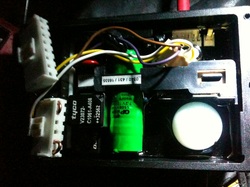Not exactly Sonic Sideshow information I know - but damn useful all the same. And it’s kind of hacking… anyway what good is a sideshow without transport?
The alarm systems go off all the time when you’re not wanting them to, get tired and lock you out of your own bike in remote lay-bys, drain the battery when the bike’s in storage, cost loads of you loads of money and generally are a bit crap. Basically if you want to look after your bike, you need to get a shed. You probably need one anyway.
I suppose people might be a bit cagey about the wiring information as a security measure, but that means that it costs hundreds of pounds to install an alarm, and then loads more to take it out again when it breaks. A decent install splices the alarm into the guts of the bikes main wiring loom so to work out what each cable does from first principles you have to get pretty intimate with the innards. Also all the cables come with colour code tags for install, but all the cables are black, so that after install you can’t tell what is what.
There are two big cable connectors on the inside, one block of six and one of eight. Here are those colour codes:
Orange –led indicator
Yellow/green – external alarm/ radio pager
Grey – led indicator
Green – protective trigger switch (to fire if a bike panel is lifted)
Green – protective trigger switch
Brown – to something that goes live with the ignition switch
Black x2 – earth
Red – power
***********************
White – immobilisation
White – immobilisation
Pink – indicators
Pink – indicators
Yellow –starter immobilisation
Yellow - starter immobilisation
Stuff like indicators are just spliced onto the bikes main loom leaving it operational, so if you cut the power to the unit they just work as normal. But the immobilisation part cuts the main loom and sends the circuit via the alarm, so these have to be bridged. There’s normally a circuit break immobilising the starter motor, and another immobilising the ignition or fuel pump. These are controlled by the white and yellow tags on the smaller cable block. So just bridge both the whites, and bridge the yellows to bypass the unit while leaving all of the wiring in place (as shown in the photograph).
And that’s it. It’s such a relief to be rid of it!
If you're thinking of using this information to steal motorbikes - you're an asshole. Why not take up tech art? You'd be a natural.
The alarm systems go off all the time when you’re not wanting them to, get tired and lock you out of your own bike in remote lay-bys, drain the battery when the bike’s in storage, cost loads of you loads of money and generally are a bit crap. Basically if you want to look after your bike, you need to get a shed. You probably need one anyway.
I suppose people might be a bit cagey about the wiring information as a security measure, but that means that it costs hundreds of pounds to install an alarm, and then loads more to take it out again when it breaks. A decent install splices the alarm into the guts of the bikes main wiring loom so to work out what each cable does from first principles you have to get pretty intimate with the innards. Also all the cables come with colour code tags for install, but all the cables are black, so that after install you can’t tell what is what.
There are two big cable connectors on the inside, one block of six and one of eight. Here are those colour codes:
Orange –led indicator
Yellow/green – external alarm/ radio pager
Grey – led indicator
Green – protective trigger switch (to fire if a bike panel is lifted)
Green – protective trigger switch
Brown – to something that goes live with the ignition switch
Black x2 – earth
Red – power
***********************
White – immobilisation
White – immobilisation
Pink – indicators
Pink – indicators
Yellow –starter immobilisation
Yellow - starter immobilisation
Stuff like indicators are just spliced onto the bikes main loom leaving it operational, so if you cut the power to the unit they just work as normal. But the immobilisation part cuts the main loom and sends the circuit via the alarm, so these have to be bridged. There’s normally a circuit break immobilising the starter motor, and another immobilising the ignition or fuel pump. These are controlled by the white and yellow tags on the smaller cable block. So just bridge both the whites, and bridge the yellows to bypass the unit while leaving all of the wiring in place (as shown in the photograph).
And that’s it. It’s such a relief to be rid of it!
If you're thinking of using this information to steal motorbikes - you're an asshole. Why not take up tech art? You'd be a natural.





 RSS Feed
RSS Feed
